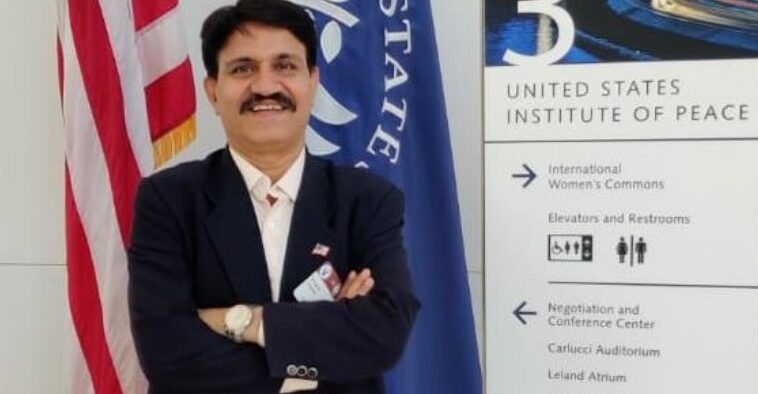“MOOCs Success Measured By Learning, Engagement, Lifelong Learning, Not Enrolment”
Share

There are multiple factors at play in determining the success of a MOOCs (massive open online course) course, but the real measure lies in the students’ learning outcomes, continuous engagement with instructors and peers, and their willingness to pursue further online courses for lifelong learning, says Dr. Durgesh Tripathi In-charge, University School of Filmmaking Associate Professor, University School of Mass Communication Guru Gobind Singh Indraprastha University, New Delhi National Coordinator, Swayam MOOCs Course ‘Society and Media’, Ministry of Education, Government of India. Tripathi shares us more information about MOOCs and other course.
How do you think MOOCs like the Yoga course offered by SWAYAM are changing the way people access education?
I would like to begin by acknowledging the contribution of Swayam platform in enhancing learning and skill enhancement opportunities for all of us especially the Gen Z. Swayam is making a significant contribution through its well-designed courses to nation building especially at a time when the youth requires a lot of re-skilling and upskilling due to the emerging technologies like AI, VR, Machine learning among others. It is a great initiative by Swayam to offer courses on Yoga as we all know and acknowledge the benefit of yoga asanas in our daily life and the impact it can have on not just the body but the soul and mental wellbeing. It will also be a step towards universalisation of yogic practices as we have seen enhanced interest of the foreigners into our ancient knowledge system with the proliferation of International Yoga Day being celebrated in all continents with equal enthusiasm and reverence.
Do you believe that MOOCs have the potential to democratize education and make it more accessible to people who may not have had access to traditional educational opportunities?
I believe great leaders are lifelong learners. And, Swayam provides that opportunity to start your learning journey at any age, from anywhere and at any time, though one requires an active internet connection with good bandwidth. Just to give you some numbers, Swayam platform has outperformed all digital education platforms by a big margin with 3.1 crore enrolments and 2.4 crore students opting for course that offer academic credits. The large numbers indicate an acceptance of the digital education amongst students, faculty, industry and other stakeholders. Now more than 288 universities across India also accepts the credits earned by the learners through Swayam portal. It also showcases that Swayam is amongst the top choices of the Gen Z who may have challenges as the courses are well designed, free and have holistic assessment systems in place. I believe Swayam platform can be a game changer for Indian educational landscape as it removes traditional barriers including the mental ones where one needs to be enrolled and dedicate specific time and visit an institution to learn something new or add a new skill to their resume. It will be beneficial for the Industry which requires to reskill and upskill the workforce in consideration of the demands of Industrial Revolution 4.0.
I would also like to point out that Coursera’s Women Skills Report indicates that India ranks second worldwide for the highest number of women learners on Coursera, thus, Digital Education is not only addressing the traditional barriers but is also setting new benchmarks.
What do you think are some of the challenges that MOOCs face in terms of providing high-quality educational experiences to learners?
Though, Digital divide and digital literacy skills remain some of the significant challenges for quality educational experiences for the learners through ed-tech platforms. But, I believe enhanced internet penetration through the flagship programme i.e. Digital India programme of Government of India, we will be having have seamless connectivity and information highways even reaching the villages and geographically difficult terrains in the country. However, we need to also look at lack of digital skills among learners who do not belong to Metro cities into consideration along with the availability of content in regional languages. Though, Government of India has already announced that it will be translating and converting more and more MOOCs courses in Indian languages to facilitate learners. I also believe we need to re-orient and re-package our courses on a timely basis considering the demands of Gen Z and Millennials who are digital natives and have reduced concentration spans in the times of attention economy.
How do you think MOOCs compare to traditional in-person educational experiences in terms of effectiveness and student outcomes?
As a faculty member, I draw immense satisfaction from a classroom lecture, however, I believe in the technology inclusion in the classrooms and using it for better learning outcomes. I believe we cannot totally shift to digital nor we can avoid technology thus, hybrid or blended learning can be an effective method or pedagogy in contemporary times. COVID 19 gave an impetus to the idea and we all adapted to the situation beautifully though not without the initial glitches. But, I believe scalability can only be achieved through technology. If I can cater to more students through a MOOCs course then why should we restrict ourselves and as it is the role of a teacher is undergoing a massive shift where learners require a sense of direction and guidance instead of total dependence on the teacher for information and knowledge. I have observed that Gen Z students are self-learners and go-getters and we should embrace the idea of technology and judiciously blend courses, modules, and juggle between online and offline learning.
In your opinion, what are some of the most important factors that determine whether a MOOC is successful in achieving its educational goals?
There are a variety of factors which are at an interplay when we consider the success of a MOOCs course- the first and foremost would be student’s learning in comparison with the intended course outcomes, student’s continuous engagement during the course with the course instructors and peers, and another important consideration would if a MOOCs course would encourage the learners to take up more online course and continue their learning trajectory throughout their lifetime, that would be a real success. I do not believe in enrolment numbers as many learners are leisure learners who leave the course after initial weeks, so some courses may be highly relevant or highly specialised but may not have great enrolments, thus, as National Education Policy, 2020 advocates we should focus on quality education as well as student centricity.
What role do you think MOOCs can play in helping to address the global skills gap and prepare people for the changing nature of work?
Not just the nature of work but the way we work is also changing with work from home models to gig economy, we are approaching work in a different manner and with ChatGPT and other such AI tools facilitating our work, we need to relook the way we perceive ‘work’, ‘jobs’ and ‘occupation’ and ‘professions’. I have a firm belief that MOOCs would play a significant role in our lives as we would require more and more updated skills with each new technological disruption. European countries are already trying to understand re-decipher the potential of MOOCs courses for their students, faculty and industry professionals as they believe that massive changes are underway. I would like to draw your attention to an article titled ‘Remember the MOOCs? After Near-Death, They’re Booming’ published in New York Times in May 2020, predicted a ‘renaissance’ for the MOOCs courses during the pandemic itself. I believe that they are greatly going to help Indians as we have a 52 percent skills gap among youth as per the India Skills Gaps Report 2022.
How do you see MOOCs evolving in the future, and what do you think their impact will be on the broader landscape of education?
As I have already emphasized, I believe there will be increased usage of MOOCs courses by India Inc. for upskilling and reskilling the Indian workforce including giving an impetus to the culture of lifelong learning. I also believe that there will be enhanced focus on Adaptive Learning strategies that brings students into the core focus of the education system and newer strategies in MOOCs like gamification and more use of Virtual Reality and Immersive learning experiences would be introduced to address the demands of 21st century learners. Learners’ data would become important to gauge the learning outcomes and understanding of the core concepts and skills. I am hopeful for the future of MOOCs in India and believe that it will help to enhance the potential of our demographic dividend manifold.
















